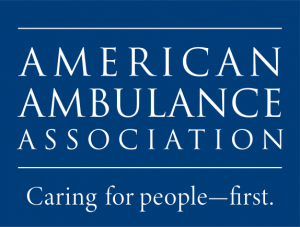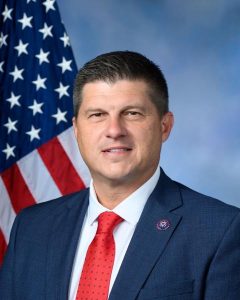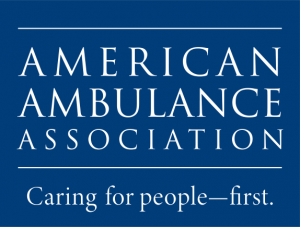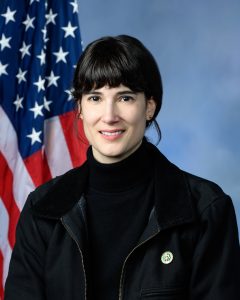CMS National Rural Health Day Webinar
|
||
|
||
|
Written by Samantha Hilker on . Posted in News.
|
||
|
||
|
Written by Kathy Lester on . Posted in Medicare, Member Advisories, News.
Written by AAA Staff on . Posted in Member-Only, News.
Written by Meghan Winesett on . Posted in Awards, Legislative, Legislative Awards, News, Press, Stars of Life.
The American Ambulance Association is proud to announce the winners of the 2024 AAA Legislative Awards. Each Member of Congress is being recognized for their strong advocacy for emergency medical services and their ongoing dedication to ambulance services across the United States. In addition to our two Legislator of the Year Awards and 25 Legislative Recognition Awards, the American Ambulance Association has named their first-ever EMS Legacy Award Winner. This award is reserved for a Members of Congress who made a substantial impact on the EMS industry during their tenure in the U.S. Congress.
Senator Debbie Stabenow (MI)
Congresswoman Marie Gluesenkamp Perez (WA-3)
Congressman Brad Finstad (MN-1)
Senators
Representatives
Written by Scott Moore on . Posted in Human Resources, News.
As many of you are aware, OSHA has published the NPRM titled the Emergency Response Rule. This rule will have substantial impacts on EMS and Fire Emergency Service Organizations should all of the provisions be finalized. OSHA will be hearing public testimony from stakeholders starting on November 12, 2024. The deadline to submit to testify has passed but it is important that any stakeholder group that will be testifying attend this free informational session being hosted by the Small Business Administration (SBA) on October 31, 2024 at 2:00E. A representative from OSHA will provide some information about the structure and format of the hearing.
Written by Amanda Riordan on . Posted in AAA HQ, News, Press, Stars of Life.
October 24, 2024
FOR IMMEDIATE RELEASE
Contact: Amanda Riordan
703-615-4492
ariordan@ambulance.org
Washington, DC—This November, the American Ambulance Association (AAA) will recognize extraordinary EMS professionals during the annual Stars of Life celebration. 143 individuals from across the United States will be honored as the 2024 Stars at the November 11–13 event.
Stars of Life pays tribute to the dedication of these hometown heroes while shining light on the critical role EMS plays in our healthcare safety net. During their time in our nation’s capital, the Stars will receive medallions and awards in thanks for their lifesaving and life-sustaining service. The Stars, accompanied by their families and executive hosts, will also meet with members of Congress and congressional aides to discuss policy issues critical to emergency medical services. In recognition of Veterans Day on November 11, special recognition will be afforded to Stars with a military or reserves background.
In addition to the Stars, Representative Brad Finstad of Minnesota and Representative Marie Gluesenkamp Perez of Washington will be recognized as Legislators of the Year, and 9 United States Senators and 16 US Representatives will receive Legislative Recognition Awards for their support of mobile healthcare. Retiring Senator Debbie Stabenow of Michigan will also be honored with the inaugural EMS Legacy Award.
American Ambulance Association President Randy Strozyk noted that, “EMS professionals work around-the-clock to deliver out-of-hospital care when it is needed most.” He continued, “We honor this year’s Stars of Life and thank them for their tireless service to local communities across the nation.”
This year’s distinguished Stars of Life honorees are:
Please note that members of the media are welcome to attend the Stars of Life Banquet at the Hyatt Regency Capitol Hill hotel on November 12, 2024 from 6:30–8:30pm. Interviews with Stars of Life as well as national EMS leaders will be available.
# # #
Caring for People—First.
The American Ambulance Association safeguards the future of mobile healthcare through advocacy, thought leadership, and education. AAA advances sustainable EMS policy, empowering our members to serve their communities with high-quality on-demand healthcare. For more than 40 years, we have proudly represented those who care for people first.
Written by AAA Staff on . Posted in News.
|
|
|
|
Written by Brian Werfel on . Posted in Medicare, Member Advisories, Member-Only, News.
Written by AAA Staff on . Posted in News.
CDC | Emergency Medical Services (EMS): A Look at Disparities in Funding and Outcomes
“Limited EMS funding may affect nationwide EMS quality. The scarcity of nationwide EMS data makes studying disparities challenging; however, studies have found disparities in EMS services based on geography (urbanicity), income, sex, and race.123 Using data from California’s local EMS agency reports, we conducted a limited case study that illustrates geographic disparities in EMS revenue, spending, and cardiovascular (CV)-related quality indicators.”
Written by Tristan North on . Posted in Legislative, Legislative Awards, News, Press, Veterans Affairs.
FOR IMMEDIATE RELEASE
Contact:
Tristan North
tnorth@ambulance.org
October 8, 2024
Senator Jerry Moran Honored with Legislative Recognition Award
from the American Ambulance Association
Washington, D.C. — The American Ambulance Association (AAA) has awarded Jerry Moran (KS) a 2024 AAA Legislative Recognition Award in recognition of his leadership in ensuring veterans continue to have access to emergency 9-1-1 and interfacility ground ambulance services.
Senator Moran introduced with a bipartisan group of Senators the VA Emergency Transportation Access Act (S. 2757, H.R. 6433) to direct the Department of Veterans Affairs (VA) to further analyze the impact of the VA Final Rule on Special Modes of Transportation and create an advisory committee to evaluate future reimbursement rates for ambulance services.
The Rule as it stands would reimburse ambulance service providers below the costs of providing medical and transport services. S. 2757 would help ensure that ambulance service providers throughout Kansas and the country do not face further cuts to VA reimbursement which would limit their ability to provide lifesaving emergency medical services to our nation’s veterans.
Due to the efforts of Senator Moran and a bipartisan group of Senators and Representatives, the VA has recently stated it will delay implementation of the Final Rule for four years which would provide time to determine more fair and adequate payment rates for ambulance services.
“We greatly appreciate the leadership of Senator Moran in ensuring that our veterans and entire communities will continue to have access to vital ground ambulance service,” said AAA President, Randy Strozyk. “His perseverance paid off with the VA recognizing the need to delay implementation of the final rule to provide more time to address concerns that the new payment system could adversely affect ambulance access for veterans.”
The American Ambulance Association will be presenting Senator Moran with his Legislative Recognition Award this November at the AAA Annual Stars of Life Event, which honors emergency medical services professionals from around the nation who have gone above and beyond in service to their communities.
Written by Meghan Winesett on . Posted in Legislative Awards, News, Uncategorized.
Press Contact
Tristan North
Senior Vice President
American Ambulance Association
tnorth@ambulance.org
FOR IMMEDIATE RELEASE
Congressman Brad Finstad Honored as 2024 Legislator of the Year by the American Ambulance Association
Washington, D.C. — September 23, 2024 — Congressman Brad Finstad, representing Minnesota’s 1st District, has been named the 2024 Legislator of the Year by the American Ambulance Association (AAA) in recognition of his exceptional leadership in tackling the pressing workforce challenges faced by the emergency medical services (EMS) industry.
As the EMS community confronts a serious shortage of qualified personnel, Congressman Finstad has emerged as a crucial champion for effective solutions. His leadership on H.R. 6433, the PARA-EMT Act, marks a significant advancement in efforts to attract and retain EMS professionals nationwide.
 The PARA-EMT Act seeks to establish an EMS Workforce Grant aimed at recruiting, training, and retaining EMS professionals. It also includes a provision to assist combat medics with first response experience in their transition to the civilian workforce and directs the Department of Labor and the Department of Health and Human Services to conduct a study on the EMS workforce shortage and the necessary training and education to meet the evolving demands of the pre-hospital industry over the next decade.
The PARA-EMT Act seeks to establish an EMS Workforce Grant aimed at recruiting, training, and retaining EMS professionals. It also includes a provision to assist combat medics with first response experience in their transition to the civilian workforce and directs the Department of Labor and the Department of Health and Human Services to conduct a study on the EMS workforce shortage and the necessary training and education to meet the evolving demands of the pre-hospital industry over the next decade.
Congressman Finstad’s leadership and commitment exemplify his dedication to sustaining a robust future for emergency medical services and to serving our nation’s veterans.
“Congressman Finstad’s devotion to the EMS workforce is vital to not only our industry, but to all of America’s communities,” stated AAA President Randy Strozyk. “His leadership has established a foundation for policies that will help mitigate the workforce crisis, ensuring our communities receive the critical care they require.”
The American Ambulance Association is proud to present the Legislator of the Year Award to Congressman Brad Finstad for his efforts on behalf of the EMS industry.
The award will be presented at the AAA Stars of Life event in Washington, D.C., on November 12th.
# # #
About AAA
The American Ambulance Association represents ambulance services across the United States that participate in serving more than 75% of the U.S. population with emergency and non-emergency care and medical transportation. The AAA was formed in response to the need for improvements in medical transportation and emergency medical services. AAA views pre-hospital care not only as a public service, but also as an essential part of the total public health care system.
Written by Meghan Winesett on . Posted in Legislative Awards, News, Press, Reimbursement.
 Press Contact
Press Contact
Tristan North
Senior Vice President
American Ambulance Association
tnorth@ambulance.org
FOR IMMEDIATE RELEASE
Congresswoman Gluesenkamp Perez Awarded 2024 Legislator of the Year by the American Ambulance Association
Washington, D.C. — September 23, 2024 — Congresswoman Marie Gluesenkamp Perez has been recognized as the 2024 Legislator of the Year by the American Ambulance Association (AAA) for her outstanding leadership in addressing the critical workforce shortage facing the Emergency Medical Services (EMS) industry.
In a time when the EMS sector grapples with a significant shortage of qualified personnel, Congresswoman Gluesenkamp Perez has emerged as a vital advocate for meaningful change. Her introduction of the H.R. 6433, the PARA-EMT Act, has been a pivotal step in advancing solutions to recruit and retain EMS professionals across the nation.
“Congresswoman Gluesenkamp Perez’s commitment to the EMS workforce is not just commendable; it is essential,” said AAA President Randy Strozyk. “Her leadership has laid the groundwork for policies that will help alleviate the workforce crisis, ensuring that our communities receive the emergency care they deserve.”
The PARA-EMT Act aims to create an EMS Workforce Grant to help recruit, train, and retain EMS professionals and tasks the Department of Labor and Department of Health and Human Services with creating a study of the EMS workforce shortage and the training and education needed to meet the demands of the pre-hospital industry over the next decade. Additionally, the legislation includes a provision to assist combat medics with first response experience in transitioning into the civilian workforce.
Introduction of this legislation reflects the Congresswoman’s dedication not only to securing a strong future for emergency medical services to meet the needs of our communities, but also her dedication to serving our nation’s veterans.
The American Ambulance Association is honored to award our Legislator of the Year Award to Congresswoman Marie Gluesenkamp Perez, a true advocate of emergency medical services.
The award will be presented at the AAA Stars of Life event in Washington, D.C. on November 12th.
# # #
The American Ambulance Association represents ambulance services across the United States that participate in serving more than 75% of the U.S. population with emergency and non-emergency care and medical transportation. The AAA was formed in response to the need for improvements in medical transportation and emergency medical services. AAA views pre-hospital care not only as a public service, but also as an essential part of the total public health care system.
# # #
Written by Tristan North on . Posted in Executive, Government Affairs, News, Veterans Affairs.
The Department of Veterans Affairs (VA) has notified Senate Committee on Veterans Affairs Chairman Jon Tester (D-MT) and Ranking Member Jerry Moran (R-KS) that the Department will be delaying implementation of the Final Rule on Special Modes of Transportation until February 16, 2029. The Committee has released a statement on the delay and the VA should be issuing a formal notification of the delay shortly in the Federal Register.
“I appreciate the VA providing the additional time to ensure a process for proper reimbursement of critical ambulance services for veterans and wholeheartedly thank Chairman Tester and Ranking Member Moran for their successful and tireless efforts in advocating for the delay,” stated AAA President Randy Strozyk. “Reimbursing ground ambulance services at Medicare rates would have a devasting impact on our members who are already struggling financially.”
The delay will allow time for a framework like the one outlined in the VA Emergency Transportation Access Act (S. 2757, H.R. 5530) to allow stakeholder input on future rates. “Our members appreciate the efforts of Senators Tester, Moran, Patty Murray, John Boozman and Susan Collins and Representatives Mike Bost and Ryan Zinke and the dozens of other members of Congress who helped push for the delay.”
The Final Rule on Special Modes of Transportation was originally scheduled to take effect on February 16, 2024, but in December 2023 the VA announced a one-year delay with the latest announcement delaying implementation for an additional four years. Under the final rule, the VA would reimburse for ambulance services provided through its beneficiary travel program at the lesser of the actual charges or Medicare rates.
We will provide more details about the delay when the VA issues its formal notice.
Written by Brian Werfel on . Posted in Medicare, News.
On September 6, 2024, the Centers for Medicare and Medicaid Services (CMS) announced that CMS and its contractor, Wisconsin Physician Service Insurance Corporation (WPS), have begun the process of notifying nearly a million Medicare beneficiaries that were potentially impacted by a data breach involving WPS.
The data breach involved WPS’ use of the third-party application MOVEit. MOVEit is a file transfer application developed by Progress Software. In May 2023, a hacker group called CL0P discovered a security vulnerability that allowed the company to steal sensitive information from secure databases used by numerous governmental agencies and corporations. This included the protected health information (PHI) of Medicare beneficiaries and non-Medicare beneficiaries stored within WPS’ databases.
The notices inform affected Medicare beneficiaries of the steps they can take to protect themselves. As part of its remedial efforts, WPS is offering affected Medicare beneficiaries one year of free credit monitoring from Experian.
CMS indicated that it was not aware of any reported incidents of fraud or improper use of a Medicare Beneficiary Identifier (MBI). However, CMS noted that, if the beneficiary’s MBI was potentially impacted, they would mail a new Medicare card with a new MBI to the patient. Thus, the data breach has the potential to impact the patient demographic information you currently maintain within your billing systems. This is especially true for AAA Members that operate in Medicare jurisdictions currently administered by WPS (Iowa, Indiana, Kansas, Michigan, Missouri, and Nebraska). Specifically, the MBIs on file for existing patients may no longer be accurate. This also has the potential to impact Medicare eligibility information that you receive from other parties like hospitals, skilled nursing facilities, etc.
AAA Members will have to make a business judgment on how to address these potential concerns. One possible option would be to implement a process to confirm the MBI of existing patients prior to the submission of new claims. Another possible option might be to implement internal procedures to flag claims that are denied for an incorrect MBI as potentially related to this issue, and to then verify the patient’s correct MBI prior to resubmitting any denied claims.
Written by Scott Moore on . Posted in Employee Wellness, Human Resources, News, Regulatory.
Written by Brian Werfel on . Posted in News.
Written by AAA Staff on . Posted in News.
 |
|||
|
Written by Samantha Hilker on . Posted in Cost Data Collection, Cost Survey, Legislative, News, Regulatory, Reimbursement.
 |
| Dear Ground Ambulance Providers and Suppliers,
We wanted you to be aware that we posted 2 reports on our Medicare Ground Ambulance Data Collection System website under Reports: |
Written by Shawn Baird on . Posted in Advocacy Priorities, Executive, Legislative, News, Press, Private Insurance, Regulatory.
The letter to the editor below was submitted to The Guardian on July 23, following the July 21 publication of the article referenced.
To the Editor of The Guardian,
On July 21, The Guardian published Jessica Glenza’s “Plan to end exorbitant ‘surprise’ ambulance bills heads to Congress.” The inflammatory title and lack of context do no justice to the years of bipartisan collaborative effort leading to the forthcoming report to Congress. As a member of the Advisory Committee on Ground Ambulance and Patient Billing (GAPB) and Immediate Past President of the American Ambulance Association, I believe it is critical to set the record straight.
It is essential to understand that EMS directly bills patients instead of insurers only as a last resort. Sadly, as a frequent entry point to healthcare, EMS often faces the unenviable task of educating people about their limited insurance coverage or high deductibles, both of which are out of our control. As mobile healthcare is entirely decentralized in the United States, it is often unfeasible for small or volunteer-staffed ambulance services to negotiate sustainable in-network rates with dozens of insurance plans. The GAPB Advisory Committee’s recommendations seek to remedy this foundational disconnect between patients, EMS providers, and health plans.
The article notes that some EMS providers are owned by private equity, but overlooks that the vast majority of ambulance services in the United States are small, often conducting only a few dozen patient transports per day. These community-based services—some of which are the sole healthcare provider for miles—face skyrocketing costs for wages, fuel, and medical supplies that threaten their ability to keep their doors open. The collaborative work of the GAPB Advisory Committee sought to address these challenges by proposing recommendations that, if adopted by Congress, would help alleviate these financial pressures while also enhancing patient protection from surprise insurance denials.
The article implies that Patricia Kelmar was the only representative of the public interest on the panel. In fact, another Committee participant was explicitly appointed to represent patient advocacy groups, and as healthcare providers, EMS professionals and physicians consistently advocate for our patients’ well-being. The committee’s composition, as established by Congress within the No Surprises Act, was intentionally diverse and included stakeholders ranging from physicians to elected officials to insurance providers to ensure balance.
Additionally, it is important to clarify that the Health Affairs research cited in the article does not provide data on actual balance bills received by patients. Rather, it roughly estimates only potential balance bills as calculated based on a flawed estimation process. Even if we were to accept Health Affairs estimates as fact, the average balance bill calculated according to their methods would be just a few hundred dollars. This is far from the sole and extreme outlier bill cited in the piece. This distinction is critical as it underscores the need for data-driven policy decisions based on real-world evidence rather than projections and one-off examples.
Finally, the piece misses entirely the largest challenge with the Committee’s recommendations and their potential adoption by Congress. Based on longstanding legal precedent, ERISA plans, which cover about half of Americans through their employers, would not be bound by any legislation drafted based on our report. In Washington state and elsewhere, innovative “opt-in” clauses enable ERISA plans to voluntarily comply with state regulation. We encourage this and hope to see it replicated throughout the nation.
People become first responders because they have a passion for caring for others, and our communities trust them to do just that—24/7. Our Committee’s report to Congress includes 14 key recommendations designed to improve transparency, ensure fair reimbursement rates, and ultimately protect patients by strengthening state and local control. If these recommendations are adopted, they will help remove patients from the middle of billing disputes, allowing EMS providers to focus on our primary mission: delivering life-saving and life-sustaining healthcare around the clock.
For a detailed understanding of our recommendations and the Committee’s work, I encourage reading the full GAPB Advisory Committee report when it becomes available later this summer.
Shawn Baird
Immediate Past President, American Ambulance Association
Member, Advisory Committee on Ground Ambulance and Patient Billing
Portland, Oregon
Written by Scott Moore on . Posted in Human Resources, Member-Only, News, Professional Standards.